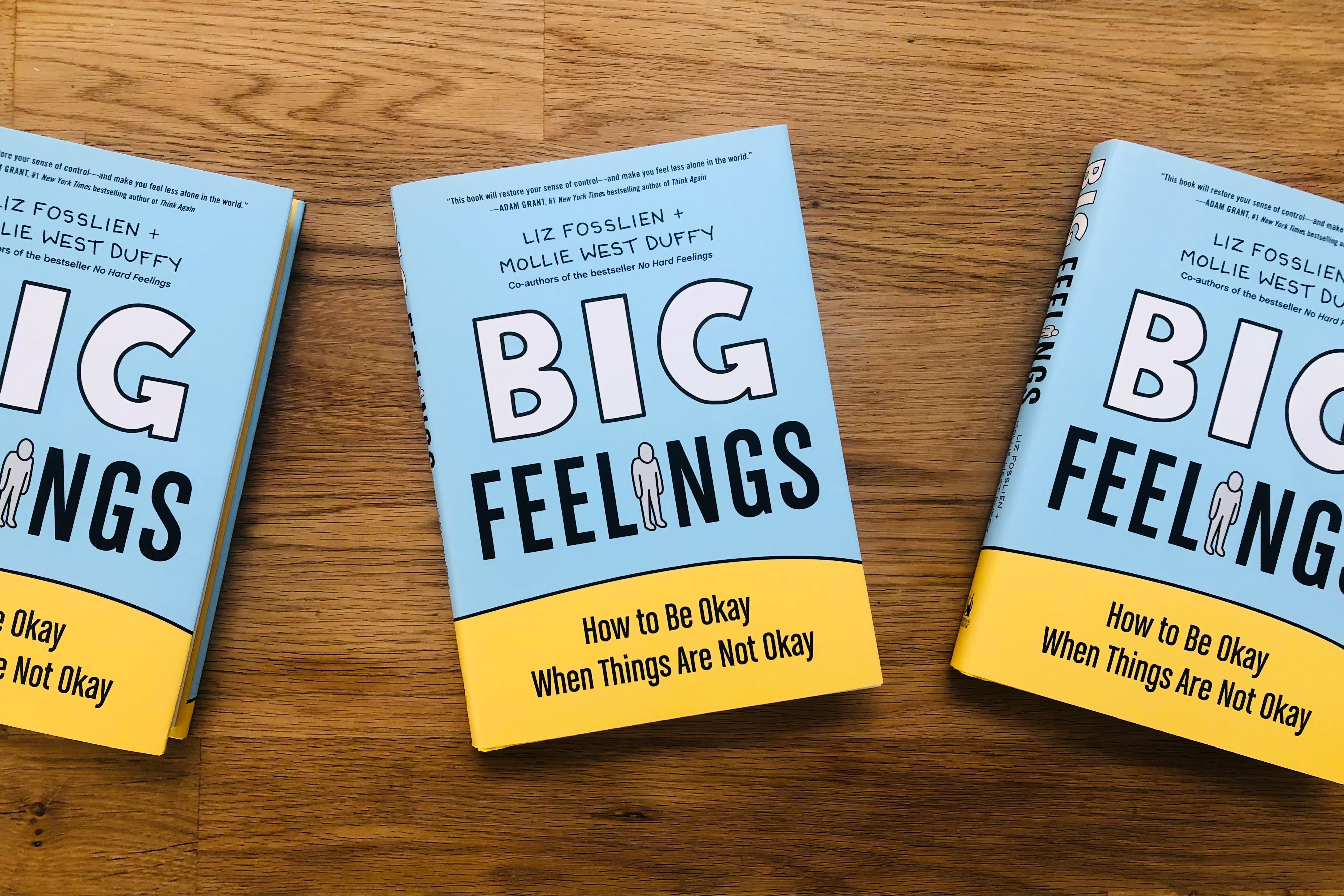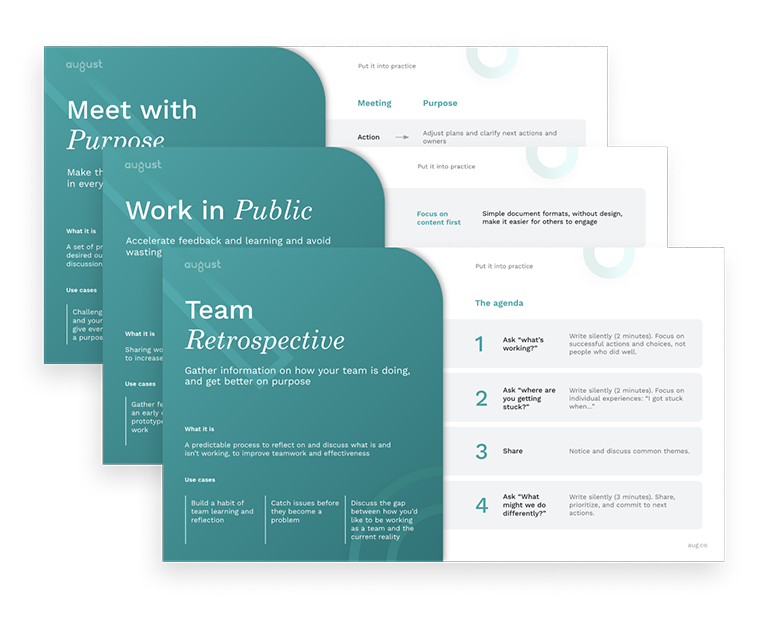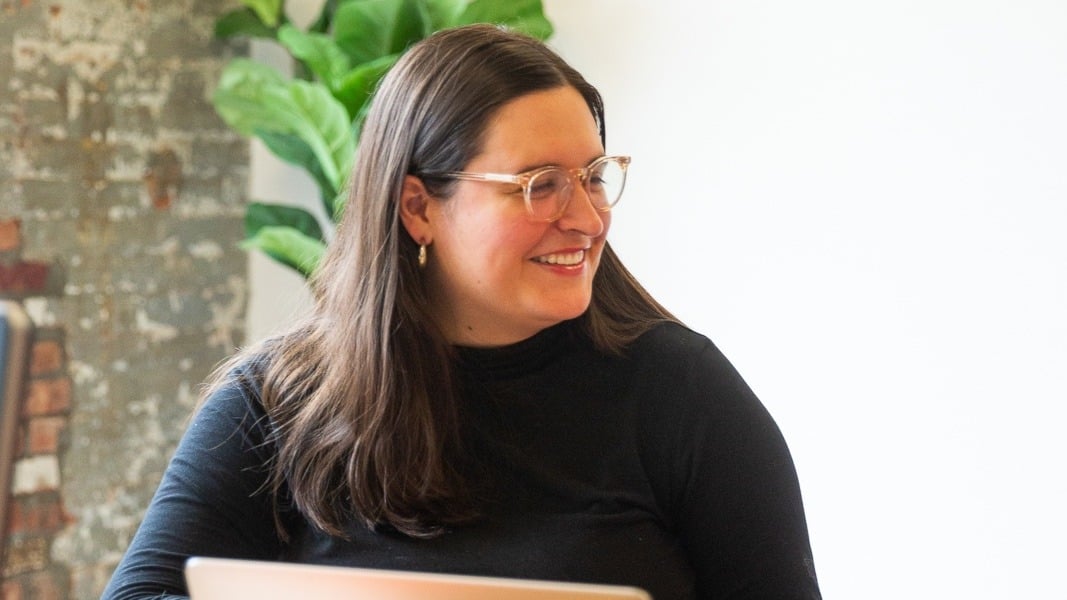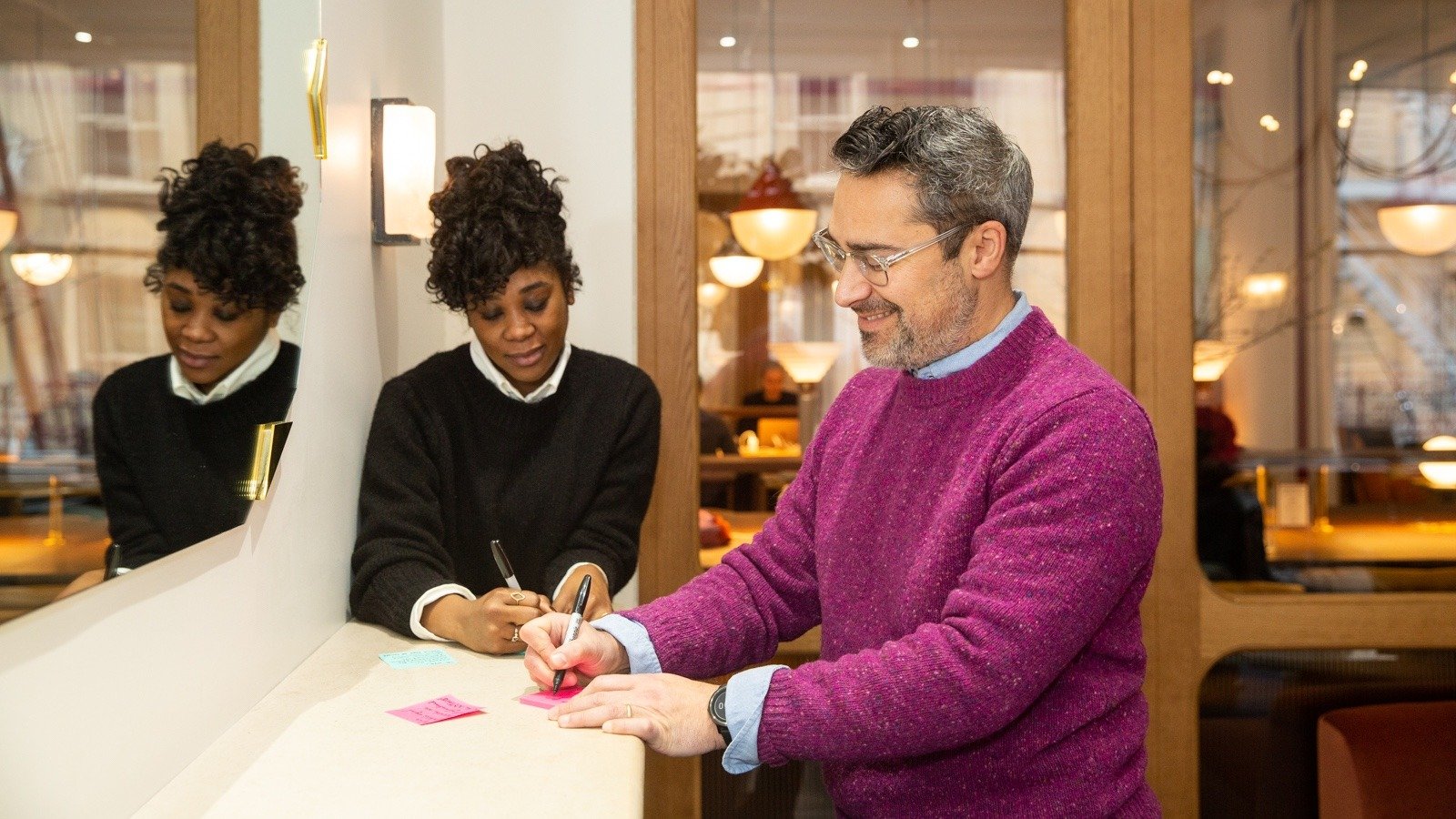Published May 13, 2022 | Updated May 23, 2022 | 9 minute read
We need to make space for big feelings at work.
Over the past two years, we’ve collectively faced some of the most difficult emotional challenges of our lifetimes. Hardships existed before the pandemic, of course, but Covid brought a wave of big feelings crashing over our daily lives at a scale we haven’t seen in a generation or more.
Many of us have struggled to carry on with our careers during this time. Our traditional workplaces just weren’t designed for this level of emotional processing.
That’s exactly what Liz Fosslien and Mollie West Duffy believe needs to change. Their new book Big Feelings takes a thoughtful and human approach to a heavy subject: How can we constructively process our big feelings in the day-to-day workplace?
I had the privilege of sitting down with Liz and Mollie recently to discuss their inspirations for writing Big Feelings, and how leaders and teammates can build workplace cultures that create space for our deepest emotions.
The interview below has been edited for length and clarity. Watch the full conversation above!
02:52
Mike Arauz: My first question for you is just, why did you write this book? Why this topic?
03:21
Liz Fosslien: Our first book, No Hard Feelings, came out in February 2019. And in the month following that book, Mollie and I both went through really difficult times in our personal lives. My father-in-law was losing his 10 year battle with cancer, I was commuting three hours a day at the time, and there was a lot going on. I was exercising, I was journaling, I had a therapist. I was doing all of the self-help things, and nothing was working.
And so that was the genesis of Big Feelings. What about these more challenging feelings, where it's not just an affirmation or a phrase that moves you through it? How do you just keep putting one foot in front of the other?
We actually pitched that book to Penguin in January 2020, pre-pandemic. And they essentially said, “It’s kind of a depressing book. What’s the audience for this?” Then the pandemic hit in March, and in June Penguin came back and said, “You know that book about really hard stuff? We think we're ready to buy.”
06:36
Mike Arauz: The timing certainly has been fascinating. One of the reasons the book resonated for me so much is because one of the things I've realized over the past two years is that the challenge, the work, is about figuring out how to navigate these feelings, as opposed to escaping them. It's about getting through them. And that certainly feels every ounce as relevant today as it was two years ago or longer.
I'm curious, as you've been having these conversations, what are you noticing out in the world? What seems to be resonating?
08:05
Mollie West Duffy: The pandemic, I feel, has made it more socially acceptable to talk about these things, because we’ve shattered that divide between work and home. People are like, ‘Yeah, I’m bringing my emotions to work.”
But are you really bringing your biggest feelings to work, like anger, sadness, grief? We just wrote an article for Harvard Business Review about anger at work, and it's the most popular article. There's a lot of angry people who want to talk about their anger at work.
Throughout the process of writing this book, when we said, “We're writing about envy and regret and these emotions we label as ‘bad,’” people do really open up. Even if they don't get into the specifics, they're like, “Oh that's very topical for me right now."
10:26
Liz Fosslien: I think one of the reasons we open up quite vulnerably about our own experiences is to help normalize it and to make people feel less alone and have left stigma around those harder emotions.
11:44
Mike Arauz: I am really interested in how the boundaries between some of those most difficult feelings like despair, regret, anger, are really breaking down in the workplace. Based on everything that you know about the workplace and feelings, what is the life of big feelings at work?
13:17
Liz Fosslein: There's definitely still this idea, even as emotions have become more acceptable in the workplace, of, “Fix it. Fix it fast. And fix it without disturbing your colleagues.”
In 2020 this big word was “Resilience.” It was the answer to everything. Oh, there's a global pandemic? Be resilient. You're struggling as a single parent at home? Be resilient. And I think that misses the fact that it's actually really important for the work environment, for the people around you, to create a space in which is easier for you to be resilient.
And so, with big feelings, I think it just comes down to acknowledging them. Because when we keep trying to ignore them or pretend that they don't exist at work or at home, that's when I think the big feeling actually becomes destructive, both to the individual and to the team.
15:43
Mike Arauz: If we're expecting leaders and teammates to engage in those conversations with each other, I think for a lot of organizations that's a whole new skill set that needs to be developed and invested in.
16:08
Mollie West Duffy: It's also creating the time and space for these conversations. I see this with the organizations I've worked with – there's a relief to be able to talk about them, to be able to share, “I was angry about that,” or, “The decision that we made, I have a lot of regret,” or, “I’m feeling a lot of uncertainty about this.”
For whatever reason most workplaces haven't built in the time to do this, even though it shouldn't take that much time.
18:52
Mike Arauz: In an ideal scenario, if you could describe an organization living its best life in how it navigates big feelings, what would be the life of big feelings at that workplace?
20:10
Mollie West Duffy: First of all, I think, this workplace would help people have better self awareness of their own styles, in terms of expressing and dealing with emotion. We have several assessments on our website and in our books to help people understand their own emotional expression style. Are you an over-emoter, are you an under-emoter, or are you somewhere in between?
And then also understanding conflict styles. Are you a conflict avoider? Do you like to get into conflict with folks? What's your anger expression style? All of these things can help us have a greater understanding of our own tendencies, but also have a shared language with other people we work with.
Then I think it's about training. There's a lot of great research that has been done about how to talk about big feelings. There are two books we recommend, Crucial Conversations and Difficult Conversations, to give people really specific phrasing to use when dealing with big feelings and having to talk with other people about them.
The last thing is space. Think about the cadence of the work that you do. Schedule check-ins regularly within that cadence, whether it’s at the middle and the end of a project, monthly or quarterly. The most important thing is to put them on the calendar. It can feel sort of awkward, putting time to discuss our feelings on the calendar. But if we don't do that, we still have feelings. They don’t go anywhere, they just are not dealt with productively.
23:57
Liz Fosslien: To me, the sign of success is a workplace where, if I'm a manager or leader, my reports are actually coming to me and saying, “Hey, I just wanted to flag something for you,” and then eloquently articulating what's going on. In that situation, you've trained them to talk about it. You've given them a shared language. That would be a sign of a really healthy workplace, where individual contributors actually feel empowered and safe talking about those kinds of things, especially with more senior leaders in the company.
24:55
Mollie West Duffy: When the book first came out we interviewed Kim Malone Scott, who wrote the book Radical Candor. She used to be a manager at Google. She told us that one of her reports came up to her one day and said, “I know what kind of day I'm going to have by the look on your face when you walk in the room in the morning.”
People pick up on leaders’ emotions. We think, “Oh, I'm hiding this from my team because I don't want to bother them with it.” Well, they can probably tell if you’re angry or frustrated.
So Kim started flagging her emotions. If she had a bad morning, her kids were driving her crazy or she had a bad commute or whatever, she would come in to say, “Hey I'm having a difficult morning. I just want to flag that. It has nothing to do with you, but I don't want to make your day worse.”
You can use this even if your mood does have something to do with the team or the organization. This happens all the time when something difficult comes up in a past meeting and then we're still processing those emotions when we go into the next meeting. You can flag it. “Hey, I was just in a meeting where there was a lot of frustration so I'm still processing it.”
We’re so afraid of big feelings, because we haven't always seen them dealt with well. We've seen people cry and yell in the workplace, and we don't want to do that. But we need to get better at talking about our emotions in a less emotional way. Naming and flagging feelings is one of the best things we can do.
33:43
Mike Arauz: Within an organization, what are some of those specific behaviors or practices that leaders in particular can use to improve how big feelings are showing up in their workplace?
34:09
Liz Fosslien: As a leader it's really valuable to open up and to share your feelings. But you also have to think a little harder about what you're saying, because a big part of your job is also to create stability for the team.
In our first book (No Hard Feelings), we talk about this concept called selective vulnerability, which is pairing a moment of honesty and openness that builds trust with a path forward, which also builds trust within the team.
For example, with the global pandemic, saying, “This is really challenging. I'm feeling it too. If you ever need to talk, I’m here. Here are resources. Here's what I'm planning to do over the next three months to make sure that we're all on the same page, that we're supporting each other. And here's what I need from you.”
That's very different than coming in and starting to sob in a meeting and saying, “This is so hard, I don't know how we're ever going to make it through.” That will undermine your abilities as a leader. People might feel a human connection to you, but they will no longer trust that you are going to keep their jobs intact or lead them through the challenging times.
37:39
Mike Arauz: My last question is, what's something that you wish I had asked you?
37:57
Liz Fosslien: When you're facing uncertainty or going through something difficult, a phrase that we have in our book that I found really personally powerful and helpful is, “I am a person learning to __.” So if you've just gotten promoted, “I'm a person learning to be in a senior leadership position.” It makes you much more open to asking for feedback, to seeking information, to learning and growing.
I think it's also helpful when you're going through hard times just to say, “I'm a person learning to cope with losing a loved one. I'm a person learning to exist through grief.” I think it’s a nice way to give ourselves more grace, which is very needed.
Buy your copy of Big Feelings today!


.jpg)






